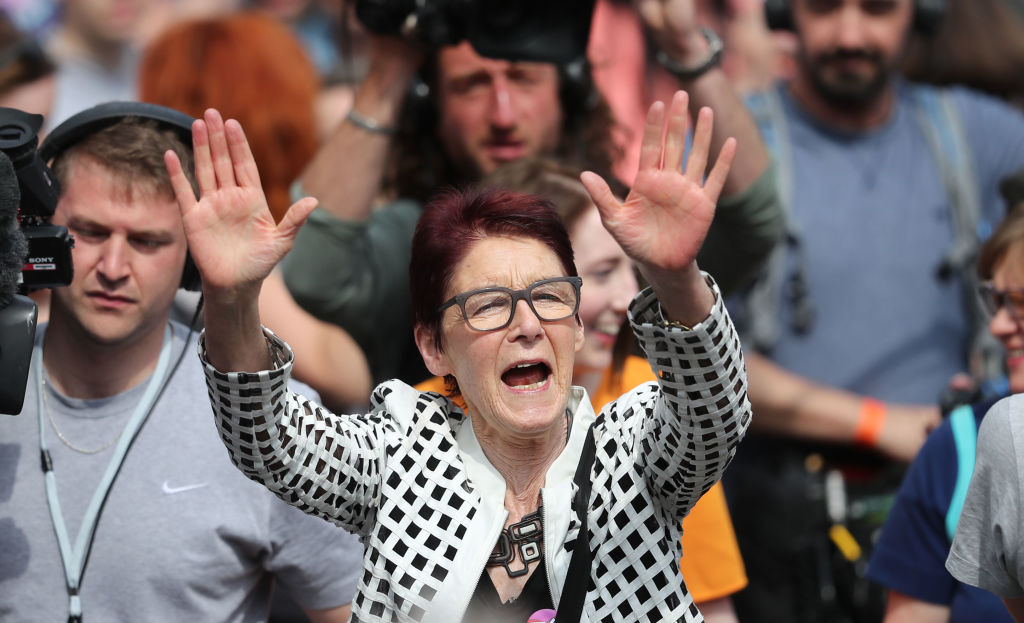
Like many people I was not surprised at the publication of a leaked document suggesting that a majority of the U.S. Supreme Court is on the brink of overturning Roe v. Wade. Although I think the extent to which Justice Alito absolutely wrote off Roe v. Wade effectively saying it’s unworkable, unconstitutional, unacceptable, that is really appalling. I felt quite devastated for women in the 26 states, and maybe more, who will likely not be able to access to abortion and would have to travel.
I’m extremely concerned about what this says and what this means for women’s rights more broadly in the U.S., because while this is directed at the right to abortion, it is also more fundamentally about women’s freedom, our freedom over our bodies, our freedom to make decisions about our own lives, our freedom to be full and fully functioning citizens.
The message that has been sent out by the U.S. Supreme Court now is that women’s freedoms do not matter, that they are to be swept aside. That is hugely detrimental to the progress that has been made on the rights of women and girls globally. Not only in countries which have been seen as slow to develop the rights of women and girls but even here in Europe, where, for example Poland, is edging towards an absolute ban on abortion. There are other European countries, which may tighten up and further restrict their abortion laws.
Read More: Inside Mississippi’s Last Abortion Clinic—and the Biggest Fight for Abortion Rights in a Generation
I remember when the Roe v. Wade ruling came. I was a young woman and absolutely needed contraception and couldn’t access it in Ireland. I remember thinking; “that is extraordinary, that’s amazing. Wouldn’t it be brilliant to live in a country where you didn’t have this worry.” I lived my young woman life with Plan B in my pocket, which is that I would go to the U.K. [for an abortion] if I got pregnant. I had 50 pounds in my pocket just in case. I was struck by how out of touch and out of sync Ireland was when you could get abortion in the UK and it looked like you were going to be able to get abortion now in the U.S. It meant a lot to me as a young woman who was becoming involved and interested in feminism and the women’s movement.
Rather ironically, Roe v. Wade really set off alarm bells among the extremely conservative, right wing Catholic cabals in Ireland. They felt that if it can happen in the U.S., it can happen here in Ireland and they wanted to ensure we could never have a right to abortion in the Irish Constitution. Despite the fact that we had a draconian law in place already against abortion with extremely stringent criminal sanctions, they set out from the mid-1970s, to engineer a situation where the country would have to vote on prohibiting abortion totally, which is, of course, what we did in 1983. So ironically, the gaining of a crucial freedom for women in the U.S. was a factor encouraging that group of conservative Catholics to propose and provoke this notion of a clause that ultimately became the eighth amendment [the eight amendment to Ireland’s constitution which recognized the equal right to life of the pregnant woman and the unborn]. So there is a very complicated history around that for us here in Ireland.
I was so conscious during the Repeal campaign [to repeal the eight amendment, which led to Ireland legalizing abortion in 2018] that we were fighting to gain a freedom that was now in jeopardy in the U.S. It was an interesting and disturbing turnaround. I also wanted our campaign to be helpful for women in many other countries, here in Europe, but also the Philippines and many parts of Africa. Worldwide every win however small the country is really important. I also think that every loss is a massive loss for the right to abortion globally, because there is an instant knock on effect. Currently there is in the region of of 26 million people who can become pregnant who can only access abortion in unsafe circumstances.
Read More: The State of Abortion Rights Around the World
For decades we saw in Ireland the impact of the abortion ban, with thousands of women being forced to travel to the U.K. every year for abortions. Women making that very lonely and bleak journey, living in a state of fear and anxiety. And that is for women who could at least even consider going to the U.K., many other women did not have the financial resources. We will never know what the impact was on those women who were not able to terminate an unwanted pregnancy because those women will never speak.
That is what is happening in the U.S. in so many states abortion is already highly restricted. Fear and worry, anxiety, distress, stress and ill health are something so many women are already experiencing and will be experiencing in even greater numbers.
Any justice system has to have regard for people’s real life needs. And if it doesn’t do that, it is merely an abstract theoretical exercise, which is used to punish people. It is an abuse of justice.
—As told to Jennifer Duggan
More Must-Reads from TIME
- Inside Elon Musk’s War on Washington
- Meet the 2025 Women of the Year
- The Harsh Truth About Disability Inclusion
- Why Do More Young Adults Have Cancer?
- Colman Domingo Leads With Radical Love
- How to Get Better at Doing Things Alone
- Cecily Strong on Goober the Clown
- Column: The Rise of America’s Broligarchy
Contact us at letters@time.com